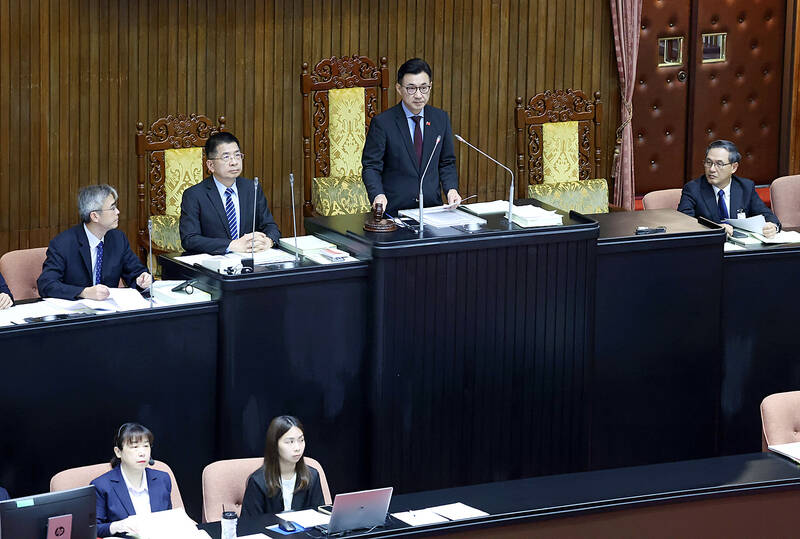The Legislative Yuan yesterday passed amendments to the Civil Service Protection Act (公務人員保障法) that clearly define, set penalties and improve complaint handling procedures for workplace bullying in government agencies.
The amendments define workplace bullying as behavior by personnel within the same agency who use power, influence or opportunity to harass or abuse someone.
Bullying can include repeated threats, insults, discrimination, humiliation, isolation or any other hostile, coercive or offensive conduct that leads to a hostile work environment harmful to the physical or mental health of civil servants, the amendments say.

Photo: CNA
In severe cases, the bullying does not need to be ongoing.
Under the amendments, the time limit for filing complaints has been set at five years for cases involving the misuse of power and three years for those that do not.
If a senior official or department head is found guilty of workplace bullying, they would face a fine of NT$500,000 to NT$1 million (US$16,928 to US$33,857), the amendments say.
If the death of a civil servant occurs due to failure to implement appropriate health and safety protection measures, the person responsible would face a sentence of seven years in prison and a fine of up to NT$2 million.
Any retaliatory or unreasonable treatment against civil servants who suggest improvements to health and safety measures, or who file workplace bullying complaints, would result in fines ranging from NT$30,000 to NT$75,000, which could be imposed repeatedly.
Those made aware of instances of workplace bullying who fail to take effective measures to stop it, or who fail to implement the legally required health and safety protections within a set deadline after official notification, would face a fine of NT$30,000 to NT$1.5 million.
If failure to provide appropriate safety and health protections results in a major disaster, meaning three deaths or more, the person responsible would face three years in prison, detention or a fine of up to NT$1 million.
The amendments would also improve complaint and incident handling procedures, as the Civil Service Protection and Training Commission would be required to convene a health and safety incident review panel to handle investigations and decide on penalties. The panel would consist of five to seven academics or experts.
Under the amendments, the commission could inspect or instruct higher-level agencies to inspect any institution reported to have improper or inadequate health and safety protections, or workplace bullying prevention measures.
If any contraventions are found, the agency must be informed and given a deadline to make improvements. If it fails to do so, the issue would be handled based on the severity of the infraction, the amendments say.
The amendments would take effect six months from their promulgation.
Additional reporting by CNA

Taiwan is to commence mass production of the Tien Kung (天弓, “Sky Bow”) III, IV and V missiles by the second quarter of this year if the legislature approves the government’s NT$1.25 trillion (US$39.78 billion) special defense budget, an official said yesterday. Commenting on condition of anonymity, a defense official with knowledge of the matter said that the advanced systems are expected to provide crucial capabilities against ballistic and cruise missiles for the proposed “T-Dome,” an advanced, multi-layered air defense network. The Tien Kung III is an air defense missile with a maximum interception altitude of 35km. The Tien Kung IV and V

The disruption of 941 flights in and out of Taiwan due to China’s large-scale military exercises was no accident, but rather the result of a “quasi-blockade” used to simulate creating the air and sea routes needed for an amphibious landing, a military expert said. The disruptions occurred on Tuesday and lasted about 10 hours as China conducted live-fire drills in the Taiwan Strait. The Civil Aviation Administration (CAA) said the exercises affected 857 international flights and 84 domestic flights, affecting more than 100,000 travelers. Su Tzu-yun (蘇紫雲), a research fellow at the government-sponsored Institute for National Defense and Security Research, said the air

Trips for more than 100,000 international and domestic air travelers could be disrupted as China launches a military exercise around Taiwan today, Taiwan’s Civil Aviation Administration (CAA) said yesterday. The exercise could affect nearly 900 flights scheduled to enter the Taipei Flight Information Region (FIR) during the exercise window, it added. A notice issued by the Chinese Civil Aviation Administration showed there would be seven temporary zones around the Taiwan Strait which would be used for live-fire exercises, lasting from 8am to 6pm today. All aircraft are prohibited from entering during exercise, it says. Taipei FIR has 14 international air routes and

Taiwan lacks effective and cost-efficient armaments to intercept rockets, making the planned “T-Dome” interception system necessary, two experts said on Tuesday. The concerns were raised after China’s military fired two waves of rockets during live-fire drills around Taiwan on Tuesday, part of two-day exercises code-named “Justice Mission 2025.” The first wave involved 17 rockets launched at 9am from Pingtan in China’s Fujian Province, according to Lieutenant General Hsieh Jih-sheng (謝日升) of the Office of the Deputy Chief of the General Staff for Intelligence at the Ministry of National Defense. Those rockets landed 70 nautical miles (129.6km) northeast of Keelung without flying over Taiwan,